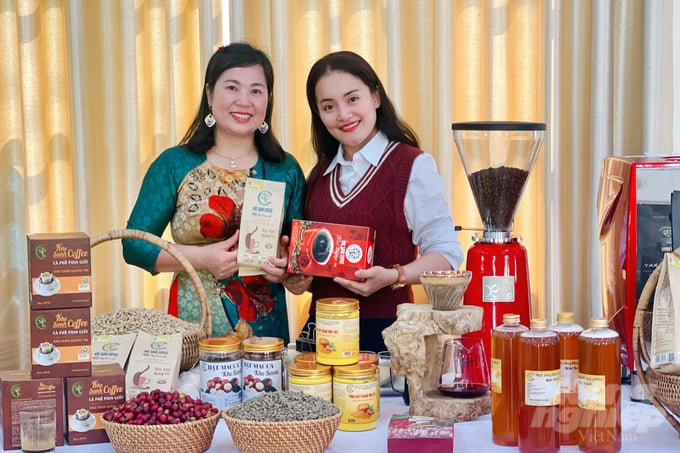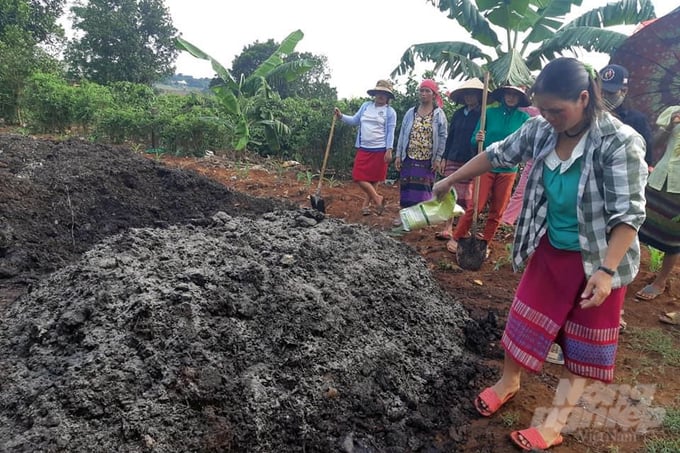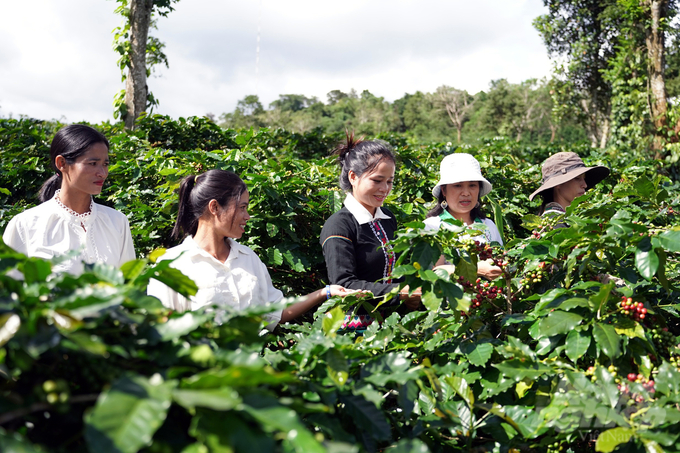November 27, 2025 | 22:41 GMT +7
November 27, 2025 | 22:41 GMT +7
Hotline: 0913.378.918
November 27, 2025 | 22:41 GMT +7
Hotline: 0913.378.918
In 2021, Mr. Ho Van Ren, along with 49 farming households in Bui Viet village, Huong Phung commune, Huong Hoa district (Quang Tri province), collaborated with the Khe Sanh Agriculture Cooperative (AC) to cultivate 41 hectares of Arabica Catimo coffee using organic methods. A number of Van Kieu farming households felt confusion upon being presented with the strict requirements put forward by Khe Sanh AC. An organic coffee plantation refers to the practice of abstaining from the use of chemical fertilizers and pesticides. The environmental and yield advantages were ambiguous, although risks associated with pests and productivity decline were evident from the initial crop of waver farmers.

Khe Sanh Agricultural Cooperative has 2 4-star OCOP products including Khe Sanh Coffee 100% Arabica powder and Khe Sanh Coffee roasted beans. Photo: Vo Dung.
Nevertheless, organic farming has resulted in enhanced agricultural productivity and quality. Additionally, it has bolstered the resilience of plants against harsh weather conditions and increased their endurance. Moreover, organic produce commands better prices in the market. The trust has been established based on the results.
Khe Sanh AC facilitates the connection between farmers to cultivate and acquire high-quality coffee. The result of this procedure is the production of two premium OCOP products: 100% Arabica Khe Sanh Coffee powder and roasted Khe Sanh Coffee beans.
The Khe Sanh Agriculture Cooperative consists of 30 official members and 115 link members. It includes 7 groups that work together to establish a closed clean coffee value system on a total area of approximately 130 hectares. The cooperative produces over 1.8 thousand tons of coffee annually. The Khe Sanh coffee product was awarded a collective trademark protection diploma by the Intellectual Property Office of Vietnam. The Quang Tri Provincial Department of Science and Technology is currently developing a geographical identification and value chain for Khe Sanh coffee.

Van Kieu people are trained on how to compost fertilizer to grow coffee organically. Photo: Vo Dung.
Ms. Nguyen Thu Hang, the President and Director of Khe Sanh AC, recalled the challenging times when she collaborated with farmers to develop environmentally friendly coffee. The process of changing the mindset of farmers was begun gradually, with a focus on one day at a time. However, the apparent advantages of plentiful crops and higher selling prices of organic coffee serve as the driving force for farmers to adopt this practice.
"In order to convince people, we were required to personally visit every coffee plantation, systematically illustrate the process, and execute trial initiatives. People only start to believe when optimal efficiency is attained. Failure to be meticulous, provide consistent encouragement and daily motivation may result in a relapse to previous agricultural methods," Ms. Hang said.
In addition, in early 2022, the Khe Sanh Agricultural Cooperative invested in a facility dedicated to the production of organic fertilizers derived from coffee husks. These fertilizers are made available to individuals on a delayed payment schedule. Formerly discarded coffee husks, which formerly resulted in environmental damage, are now being utilized as fertilizers. Residents have the opportunity to purchase organic fertilizers at a discounted rate of 20% compared to the market price. However, cooperative members receive an even greater benefit, with a 50% subsidy. Utilizing organic fertilizers has facilitated the restoration of soil, enhanced soil porosity, stimulated robust plant growth, diminished pest populations, and demonstrated environmental friendliness. Additionally, this has enhanced the caliber and worth of Khe Sanh coffee, providing lucrative prospects for the Van Kieu community in Huong Hoa district.

Khe Sanh Agricultural Cooperative accompanies Van Kieu people to grow clean coffee. Photo: Vo Dung.
In order to broaden its market reach and enhance its worth, the Khe Sanh Agricultural Cooperative has entered into consumption agreements with five enterprises. Khe Sanh coffee products are also sold through various domestic retail channels and distribution companies.
We are presently in the process of creating a premium OCOP (One Commune One Product) item using exclusively 100% Arabica Khe Sanh Coffee powder. Additionally, we are working together with various groups to establish agroforestry coffee chains. This not only increases the environment and agricultural tourism panorama, but also improves the quality of coffee. "The 5-star OCOP product will enhance and expand the reach of Quang Tri coffee, increasing its value," stated Ms. Hang.
According to Mr. Hoang Minh Tri, the Quảng Trị Rural Development Department's leader, the Khe Sanh Agricultural Cooperative is playing a significant role in promoting Khe Sanh coffee to both domestic and foreign consumers by creating high-quality OCOP goods. Khe Sanh coffee consistently received accolades for three consecutive years, from 2021 to 2023, in Vietnam's specialty coffee quality evaluation competition.
Prospects for Quang Tri Coffee
The cultivation of Arabica Catimor coffee was initiated in Huong Hoa during the early 1900s and currently spans an area of around 4,000 hectares. Khe Sanh coffee has achieved global recognition as a renowned coffee brand. Quang Tri has been chosen by the Ministry of Agriculture and Rural Development as one of the eight provinces to carry out the Vietnamese specialty coffee development project from 2021 to 2030.
Translated by Linh Linh

(VAN) According to Mr. Vo Minh Thanh, Director of the Tay Ninh Department of Agriculture and Environment, Resolution 57 has created a new development pathway for the locality, shifting from traditional toward modern agriculture.
/2025/11/26/4909-2-154329_878.jpg)
(VAN) Pearl grouper farming in HDPE cages not only delivers economic efficiency but also contributes to protecting the environment, creating jobs, and promoting marine-based experiential tourism.

(VAN) The model of making a living under the forest canopy through the agroforestry system in Van Son commune, Bac Ninh province, is expected to generate an annual income of approximately VND 30 million/ha.

(VAN) Many enterprises in Can Tho are harnessing natural energy and reducing greenhouse gas emissions in their production processes, thereby contributing to the promotion of a sustainable green transition.
/2025/11/24/3536-2-112800_176.jpg)
(VAN) Dong Nai now has tens of thousands of hectares of forests certified for sustainable management, and this area will continue to be expanded in the coming period.

(VAN) Vinh Ha hamlet (Dai Xuyen commune, Hanoi) is shifting away from small-scale farming as households adopt bioscurity into their breeder chicken models.

(VAN) Heavy rains make aquatic species more vulnerable to disease. Proactive water management and high-tech systems help farmers prevent outbreaks and protect yields.